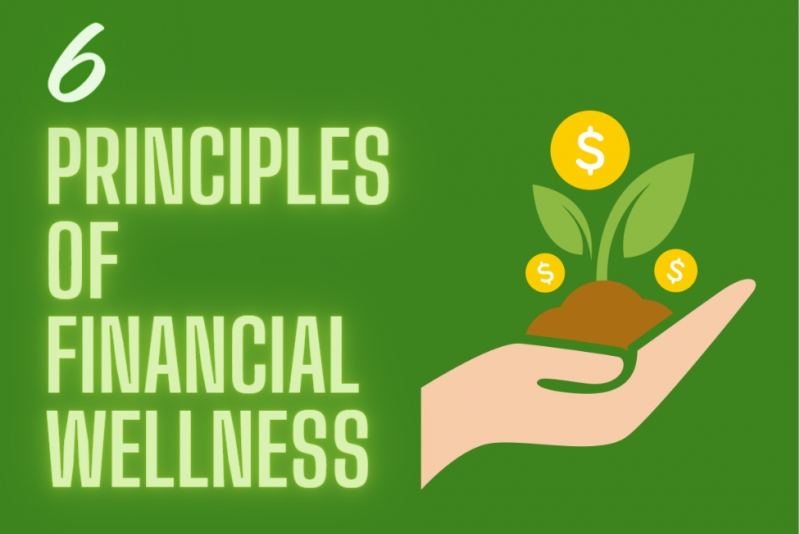Introduction
You’re often told money can’t buy happiness, but managing it well can certainly ease your mind. That’s why we’re exploring the six principles of financial wellness.
You’ll learn how to:
- Set realistic goals
- Budget wisely
- Save for emergencies
- Manage debt
- Spend mindfully
So, let’s dive in and see how balancing your finances can truly improve your mental health.
Understanding Financial Wellness
Before you can improve your financial wellness, you must first understand what it involves. It’s not just about how much money you have in the bank. It’s about the balance between your income, spending, saving, investing, and how you’re planning for your financial future. It’s about having the financial stability to meet your needs, while also saving for your goals and dreams.
You might think it’s as simple as earning more money, but that’s not always the case. You could be earning a six-figure salary, but if you’re living paycheck to paycheck because you’re not managing your money wisely, you’re not financially well.
Financial wellness also involves understanding your relationship with money. Are you using it as a tool to improve your life and reach your goals? Or are you letting it control you, causing stress and anxiety? It’s important to have a healthy relationship with money, where you’re in control, not the other way around.
Setting Realistic Financial Goals
Setting realistic financial goals is pivotal to your financial wellness. It’s crucial to distinguish between what’s achievable and what’s far-fetched.
Let’s explore how you can set and reach these vital goals for a healthier financial future.
Importance of Goal-setting
Understanding the importance of setting realistic financial goals is crucial for your financial wellness and mental peace. It’s not just about stashing money away, but about creating a clear roadmap to achieve your dreams.
Goal-setting grounds you, giving your money a purpose, and making your financial journey less daunting. It helps you to prioritize your spending, save more effectively, and avoid unnecessary debt. When you have a clear target, you’re less likely to make impulsive financial decisions that can derail your progress.
Realistic Vs Unrealistic Goals
In light of the importance of goal-setting, it’s crucial for you to distinguish between realistic and unrealistic financial goals, as this can make a significant difference in your financial wellness and mental health.
Realistic goals are achievable and specific. They’re grounded in your current financial situation, considering factors like your income, expenses, and savings.
Unrealistic goals, by contrast, are vague, unattainable, or don’t consider your financial reality. Setting unrealistic goals can lead to frustration and stress, which are detrimental to your mental health.
On the other hand, realistic financial goals can motivate you, bringing a sense of accomplishment and improved mental well-being. Therefore, it’s essential to set realistic financial goals to maintain both financial wellness and mental health.
Achieving Financial Goals
Carrying over the discussion from realistic versus unrealistic goals, it’s now time for you to learn how to effectively reach your financial goals by crafting realistic and attainable ones.
Start with defining what you want in clear, specific terms. Don’t just say, ‘I want to save money.’ Instead, decide how much you want to save and by when.
Break down large goals into smaller, manageable steps. If you aim to save $12,000 in a year, that’s $1,000 a month or $250 a week. See, doesn’t that sound more doable?
Also, remember to be flexible. Life happens, and you might’ve to adjust your goals.
The Art of Budgeting
You’ll find that mastering the art of budgeting can significantly boost your financial wellness by giving you a sense of control over your money. It’s not just about restricting your spending; it’s about making informed decisions on how to allocate your funds effectively.
Creating a budget doesn’t mean you can’t enjoy life. Instead, it allows you to prioritize your needs and wants, ensuring you’re not spending more than you earn. Start by tracking your income and expenses. It’ll give you a clear picture of where your money’s going and help identify areas for potential savings.
Next, set realistic financial goals. Whether it’s saving for a vacation, paying off debt, or building an emergency fund, having a target can motivate you to stick to your budget. And remember, it’s okay to adjust your budget as your financial situation changes.
Lastly, don’t forget to include a little fun money. It’s a small allowance for you to spend on whatever you want without feeling guilty. This way, you’re not depriving yourself and budgeting becomes less of a chore and more of a positive habit.
With practice, you’ll see how budgeting can lead to financial stability and peace of mind.
Importance of Emergency Savings
Building an emergency savings fund is an essential step you can’t afford to skip in your journey towards financial wellness. This isn’t just about having a safety net. It’s about bolstering your mental health by reducing financial stress.
Think about it. When you’ve got money set aside for unexpected expenses, you’re less likely to worry about financial emergencies. That’s because you’re prepared. You’re in control. There’s a psychological payoff to that.
Sure, it’s not easy to save, especially when you’re living paycheck to paycheck. But even a small amount saved consistently can add up over time. Start small. Automate your savings if possible. Make it a habit.
Remember, it’s not just about the amount you save. It’s about the peace of mind that comes with knowing you’re covered if something goes awry. That’s financial wellness.
In the end, having an emergency savings fund isn’t just a financial strategy. It’s a mental health strategy. It’s about resilience, stability, and peace of mind. So don’t underestimate its importance. Embrace it. And watch your financial wellness, and your mental health, improve.
Smart Debt Management
Just as having an emergency fund bolsters your mental health, managing your debt wisely is another crucial step in achieving financial wellness. Remember, not all debts are bad. In fact, some, like mortgages or student loans, can be considered investments in your future. The trick is managing them properly.
Start by understanding your debt. Know who you owe, how much, and the interest rates. This isn’t the time for hazy estimates, you need hard numbers.
Next, prioritize payments. Generally, it’s best to pay off high-interest debts first to save money in the long run.
Consider methods like the snowball or avalanche to tackle debt. With the snowball method, you’ll pay off the smallest debts first for quick wins, then move onto larger ones. The avalanche method focuses on paying off high-interest debts first.
Lastly, automate payments to avoid missing deadlines and incurring late fees. Remember, it’s not about eliminating debt completely, but managing it smartly. It’ll take time, patience, and discipline, but your mental health and financial wellness are worth it.
Mindful Spending and Investing
Now that you’ve started managing your debt wisely, it’s time to consider the impact of your spending and investing habits on your financial wellness.
Mindful spending isn’t about depriving yourself – it’s about understanding the value of your hard-earned money. It means making purchases with intention and awareness, rather than impulsivity or habit.
Consider each purchase. Ask yourself, ‘Is this a need or a want?’ and ‘Will this bring me long-term happiness or just momentary satisfaction?’ By doing so, you’re less likely to make regrettable spending decisions and more likely to save for future needs.
Similarly, mindful investing means being informed about where your money is going. Don’t just throw your money into any investment. Research, understand the risks, and ensure it aligns with your financial goals. Remember, it’s not just about making more money, but about securing a stable financial future.
Practicing mindful spending and investing can significantly boost your financial wellness. It not only leads to better money management but also reduces financial stress, contributing to improved mental health.
Frequently Asked Questions
How Does Financial Wellness Impact Physical Health?
When you manage your finances well, it reduces stress, leading to better physical health. Financial wellness helps you afford healthier foods, medical care, and fitness activities.
If you’re financially secure, you’re less likely to lose sleep over money worries, reducing risks of heart disease and obesity.
Can Financial Wellness Techniques Help With Managing Student Loans?
Absolutely, financial wellness techniques can certainly help you manage your student loans more effectively.
It’s about learning how to budget, save, and plan for the future. By understanding your loan terms, setting up a repayment plan, and prioritizing your spending, you’ll be better equipped to handle your student debt.
It’s not just about paying off loans, it’s about establishing healthy financial habits that’ll benefit you in the long run.
What Are Some Mental Health Benefits of Achieving Financial Wellness?
Achieving financial wellness can substantially enhance your mental health. It reduces stress related to money matters, fosters a sense of security, and promotes overall peace of mind.
When you’re financially stable, you’re less likely to experience anxiety or depression tied to monetary concerns. It also empowers you, boosting your self-esteem.
How Can Financial Wellness Principles Be Incorporated Into a Daily Routine?
Incorporating financial wellness principles into your daily routine can be achieved in simple, practical ways. Start by setting a budget and sticking to it. You’ll need to track your spending, save where you can, and avoid unnecessary expenses.
Invest in your future by setting aside money for retirement or a rainy day fund. Make sure you’re paying off any debt as quickly as possible. It’s a gradual process, but you’ll see the benefits over time.
Are There Specific Financial Wellness Strategies for Retirement Planning?
Yes, there are specific financial wellness strategies for retirement planning.
You should start saving early, even if it’s a small amount.
Take advantage of employer-matched retirement plans, if available.
Diversify your investments to reduce risk.
Consider hiring a financial planner, they’ll help you stay on track.
Conclusion
So, you’ve grasped the principles of financial wellness.
You’re setting realistic goals, mastering your budget, and building your emergency savings.
You’re tackling debt wisely and spending and investing mindfully.
Keep it up! Your financial health is just as important as physical or mental health. It’s all about balance.
Remember, it’s okay to make mistakes, they’re part of the learning process.
Keep striving for financial wellness, your mental health will thank you.





